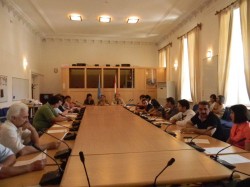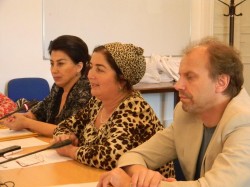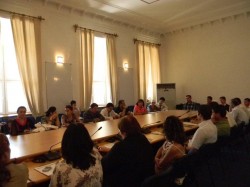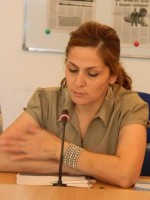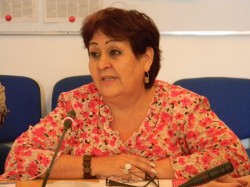Issues of domestic violence in Tajikistan are again in the focus of local media
Date:
For more information, please contact:
Muhabbat Yakubova
Communication Specialist
UN Women Tajikistan
E-mail: [ Click to reveal ]
The given contest is conducted twice a year starting from 2010. The last contest was held in November 2011 and the announcement about the fourth contest was made at the outcomes of the previous contest. The given contest was officially announced in mass media and all media agencies were advised to disseminate this information among their media colleagues. “Your participation at the contest is important but very important is that through your article, TV or radio program you provided information to people, changed someone’s wrong perception and made him/her think about his/her life, values and attitude,” said Surayo Shujoat, the member of contest review committee.
The submission of materials to the contest took place during three -month period (March-May) and total of 23 newspaper articles, 7 radio programmes and 4 TV programmes on domestic violence issues were received from journalists. The contest review committee has carefully evaluated all materials that have been submitted and after careful consideration based on three different nominations (best newspaper article, best radio programme and best TV programme) winners of the contest have been selected. During the official awarding part 9 journalists – the winners of the contest were awarded with prizes. Additionally, 10 more journalists were awarded with incentive prizes for their submitted works.
"Preventionon and elimination of domestic violence require the use of effective tools. Mass media is one of these effective ways and we admit how important role it plays in forming public opinion and changing behavior patterns. We believe that this type of contest will lead to facilitation of the gender equality and eradication of domestic violence in Tajikistan,” said Zaitoona Naimova, OSCE National Gender Officer. It is to note that the number and quality of materials submitted to the fourth contest have significantly increased and improved. Particularly, radio programmes were of high quality and contained good analysis of the topic of the contest.
Viloyat Mirzoeva, UN Women Portfolio Manager thanked all journalists for their work and interest in prevention and elimination of domestic violence issues and invited them to lobby adoption of Tajikistan Law on Domestic Violence. “Please be active in covering issues related to domestic violence and I believe in cooperation we will be able to achieve fruitful results,” she added. Further she introduced event’s participants with the Council of Europe Convention on preventing and combating violence against women and domestic violence, which was translated into Tajik recently by UN Women.
“Mass media has a strong power and influence. We recommend journalists to cover more stories on domestic violence with deep analyses,” said Alfredas Zabieta, the Director of PDV. “This issue has many different angles that need to be addressed and covered and raise public awareness on them.”
After the official awarding part, a live discussion devoted to problems of domestic violence in Tajikistan took place between participants of the ceremony. The event was attended by representatives of the Committee of Women and Family Affairs under the Government of Tajikistan, US and German Embassies, local mass media, international and local civil society organizations and others.
